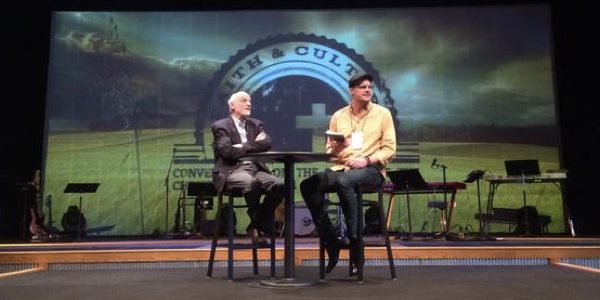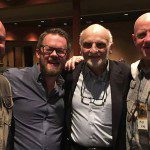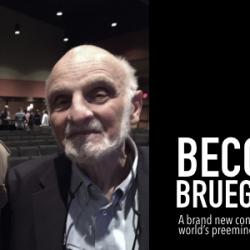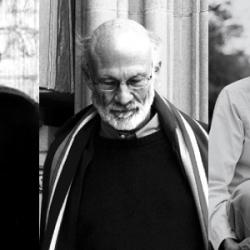 The Redemption Church staff & friends are in St. Joseph, MO today, listening to Walter Brueggemann talk about The Prophetic Imagination. Here’s a set of my notes from the first lecture he gave.
The Redemption Church staff & friends are in St. Joseph, MO today, listening to Walter Brueggemann talk about The Prophetic Imagination. Here’s a set of my notes from the first lecture he gave.
CONTEXT
We live in in the midst/under the rule of Empire
- Totalism: totally contained socio economic political educational social system outside of which there is nothing imaginable, thinkable, sayable, doable… that’s where we live.
- That was the regime of Pharaoh, Nebuchadnezzar, Caesar.
- The money has coopted the systems & institutions… to large extent, the church.
- Church’s job is to maintain a baptism that contradicts the totalism, which is hard, because that’s how all the goodies are administered.
- Violence, surveillance, torture.
- Exceptionalism: there’s never been anyone like us in the world… blah, blah, blah… that’s my first point.
The totalisms silence all criticism
- The king said to Amos “why don’t you go south and make your messes there.”
- Habakkuk, “keep silent.”
- Luke 19 triumphal entry… the Pharisees come to JS & ask him to tell his disciples to be quiet. Brueggemann says he thinks the Pharisees were his good friends & they wanted him to live.
- JPII told the liberation theologians to be silent when he gave them communion.
- Thru neo-liberal capitalism they are now working to keep silence by saying there’s not enough money to teach art & music in school. Totalisms want to keep the artists quiet because they think outside the box & are dangerous. Education is coopted, while the human spirit shrivels.
Silencing Kills
- Ferguson.
- Finally the silence will be broken, with violence if necessary.
- “Don’t ask don’t tell” maintains the illusion.
UTTERANCE
“The prophetic Imagination is breaking the silence. It is the act of saying the unsayable, it is the act of thinking the unthinkable, it is the act of imagining the unimaginable, it is the act of bearing witness to reality that exists beyond the administration of the totalism.”
The prophetic is a word from Elsewhere: and the word from elsewhere is the opposite of religious kitsch. Most sermons are religious kitsch.
- The prophets do not speak directly to issues. It’s a big mistake of liberals to think the prophetic speaks to issues.
- They speak poetic imagine and metaphor that subverts the efforts of the totalism
- When prophets start teaching in prose they become much less interesting.
- They create images & art that makes new things possible.
- Where does the new imagination come from? It comes as a gift from the holiness of God. They come from outside the totalisms.
The word from elsewhere is a word of judgment.
- Not hellfire & damnation.
- Not an interventionist & supernatural God.
- The phrase he uses is that the word of judgment says: The assertion that there are non-transgress-able limits…. Limits that cannot be transgressed… which is how you get “thou shalt not…”
- The church needs to be having a conversation about what are the non-transgressible limits that are ordained in the structure of the creation according to the will of the creator God.
- The reason this is important is that the totalism believes there are no limits.
- No limits to how much you drink; no limits to sex. No limits to the number of muslims we can justifiably kill. No limits to the number of black who live in poverty; to the number of blacks you kill if you can keep it off camera.
The word from elsewhere is a word of hope.
- Prophets connect the dots between conduct & outcomes; showing that some kinds of conduct are not permitted because it leads to unbearable consequences.
- Our economy is in freefall & nobody knows what do about it.
- It’s is in free fall because we are systemically transgressing non-trasgressable limits.
- The prophetic is ORIGINARY.
- The Prophetic originates… it BIRTHS.
- They bear witness to the originary stirrings of the Spirit that cause newness that is beyond exploration.
- The totalism does not believe anything new is possible!
- The prophetic causes newness that can never be stopped by the anxious power of the totalism.
- Prophetic ministry is about bearing witness to the emerging of newness that is inexplicable.
- Prophets are about homecoming, emancipation, righteousness, justice, compassion… the inexplicable emergence of human possibility in the face of totalisms that have programmatically shriveled human possibility.
- What’s coming is a new internationalism that might even lead to disarmament when we get over being the last superpower on earth.
- What’s coming is a new ecumenism (I remember when a Methodist marrying a Baptist was a mixed marriage)… requiring us to reformulate our speech.
- “The old world of Christendom w/it’s triumphalism can no longer contain the spirit of the creator God who is making all things new… the totalism does not want us to notice it because they think it cannot happen.”
RANDOM THOUGHTS ABOUT THE CHURCH
The church is the meeting where the news is announced of saying unsayable, thinking unthinkable and imagining the unimaginable.
- When you have a privatized gospel about me an Jesus going to heaven, it turns out to be kitsch.
- Prophtic utterance is providing imaginative material… for the church to articulate a sub-version of reality.
- This sub-version intended to subvert the dominant version of reality which is a lie.
- …re-articulate the meaning, the liturgical space for the re-performance of a sub-version of reality that pretty directly contradicts the dominant version, which is a script of death…
Surely more than one of you are saying “That’s all terrific. But I can’t say that in my church.”
- Poetic performance of artistic speech, endlessly elusive, filled with metaphors that have no single meaning.
- The metaphors we’ve killed by familiarity have no meaning.
- You can do that with texts, you just have to expand the repertoire. If you do that you’ll see that the images contradict each other.
- If you push it far enough people begin to notice that there is unsettled conflict in the scriptures because there is unsettled conflict the heart of God. And we see that I’m made in the image of God because I’ve got an unsettled conflict inside of me.
- Give the texts of certitude a little rest.
- Social analysis is a fancy way of saying follow the money.
- When we were all safely in Christendom we didn’t have to think, we could just repeat the certitudes. That’s not where god has put us now… God has put us in a place where we have to outthinking and out-speak the totalism.”
Q&A:
The holiness tradition of Leviticus & the justice tradition of Deuteronomy are in deep tension that we cannot solve.
- Holiness wanted a static order where nothing had to change.
- Justice order said, no everything has to change cuz you’ve transgressed a non-transgressable limit.
- The argument remains unsettled.
- The whole mystery of psychotherapy is giving air-time to parts of my own script that I have chosen not to remember. Freud’s great Jewish insight was that you will not have health until you give those scripts airtime. It’s a healthy thing even if its an unsettling thing.
Polyvalence in the text is so important. You cannot solve the tension between contradicting texts, or silence the minority reports because you never know when you will need them.
- I was trained in rhetorical criticism which says don’t has historical questions. They can’t take you anywhere. What’s this text saying?
- The first reading is big. You begin to notice the actual process of the text. We are trained to read for the conclusion so we can get a new formula.
- The text is performing something by the way the words are arranged… leaving some gaps & some spaces… [the first reading is] slowing down and relishing the artistry of the text.
How to read the OT…
People like you and me are inescapably going to mess up the text… we bring to it reading assumptions that are very powerful & we try to keep them under discipline, but we don’t want to disown them… that’ll be alright.
- I think there’s ample grounds for despair.
- John Buchannon’s last editorial in The Christian Century comes very close to despair…. He could only manage hope in the last sentence.
- He says the prophet says both “I am in despair and have no hope…” then a few verses later “but I call this to mind… and remember great is thy faithfulness…”
- On despair: Remember small performances of faithfulness small tho they may be… they are the wave of the future.
On the Cross…
I think that the cross (not a theologian & don’t have clear doctrine of atonement), is the outcome of JS’s resolve to embody the faithfulness of God right in the face of the totalism. Everybody knows a full commitment to that kind of neighborly fidelity will lead to execution. Every once in awhile somebody does it, although we almost never intend to. When we do this, it exposes the weakness of the totalism.
“We live in an age of acquiescence and nobody gives a shit… we’re all bought off.”
“The test point is pain: who’s hurting & what’s causing the pain? Why pick out the pain? The cross. The cross is the disclosure of the pain of God. Our work is to locate the equivalent pain in the world that is caused by the same systemic factors. If liberals & cons. Could have a conversation about pain & what’s causing pain, we would discover than nobody has high moral ground… that won’t get us through all the deep disagreements, but I think it’s a place to start.”
- “The Jewish Christians were astonished that the Spirit was poured out on the Gentiles… cradle liberals astonished God’s spirit poured out on conservatives & vice versa. They can be together because their baptism called them beyond their conservatism & liberalism. “
- If we are faithful becoming like the dominant culture is not a clear and present danger.
- Faithfulness has consequences… we’re all measuring how far we can take a step.
- I don’t mind dying for Christ, I can do that. But I do not want to be inconvenienced.”
On psychotherapy & the prophetic voice:
My long years of psychotherapy I got confirmed what I had read. That is that one insight by a person in therapy is worth ten suggestions by the therapist. One insight made by the congregant is better than 100 certitude by the clergy. So we need material out of which we can make connections, and space in which to make connections, and then honor the outcomes. That’s why I make an accent on the poetic. You can’t hammer people with the poetic. You hammer people with formuli.
- “The prophets are not so much angry as they are sad… they are sad because they see where this is going.”
- I don’t know how it is in your tradition, but in my tradition the authority of the preacher has collapsed… so you have to communicate in a different mode. Everybody trusts your authority when you mouth the certitudes to which we all agree.
- Jer. 20. The prophet said woe is me, he should have said woe is I, but he had enough trouble already.
- Give the texts of certitude a rest. You can haul them out at funerals. A funeral is no time to be didactic.
- I don’t think just anybody can haul out the bible and read it. You have to give them good equipment… I don’t see that as being in any great tension with text of certitude except that if you look closely at the textw of certitude many are less certain than we took them to be.
On reading the text faithfully / first reading.
- I get invited to a big spectrum of church traditions… my colleague asked me why that happened, and I think it’s because I stay close to the text. People are not aware of my ideological thrust. People can tell you are more or less honoring the text & letting it say things that they don’t want to hear.
- Psalm 22:1, an attestation that the Psalmist was genuinely forsaken by God. His colleague would say “well it seemed like that” the word “seem” is Docetism.
- You don’t have to be an economists to know everything alludes to money & power… money comes up everywhere. The way we miss that [the emphasis on money] is we filter the bible through a confessional lens that excludes everything interesting.













